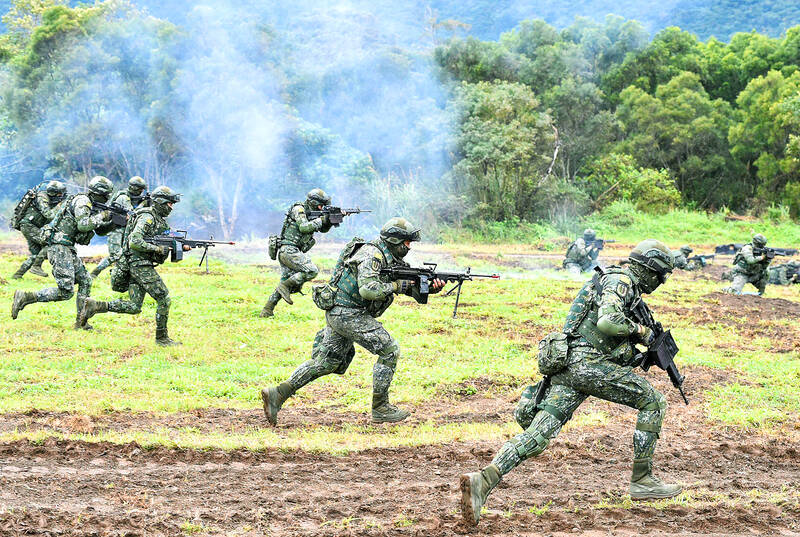A military crisis in the Taiwan Strait that would involve the US was ranked as a “Tier 1” contingency, the results of the Preventive Priorities Survey released by the Council on Foreign Relations think tank showed on Wednesday.
Tier 1 contingencies should be given a top priority when Washington this year makes efforts to prevent potential conflicts, the US think tank said.
The likelihood of “an escalation of coercive pressure by China toward Taiwan, including heightened military activity, precipitates a severe cross-strait crisis involving the United States and other countries in the region” was “moderate,” but it would have a “high” impact on US interests, the survey said.

Photo: AFP
The council first included the possibility of a Taiwan Strait crisis as a “Tier 2” contingency in 2019, reclassifying it as Tier 1 in 2021.
With most Tier 1 contingencies concerning potential flashpoints involving the world’s superpowers, the risk of the US becoming embroiled in a military confrontation with China or Russia, or both, has risen, the survey said.
“Although no Tier 1 contingency was judged to be very likely in 2023, it is still sobering that each was given an even chance of occurring,” the council said.
“The [US President] Joe Biden administration is faced with great power rivalries and nuclear program tensions as it attempts to navigate a dangerous geopolitical landscape. Striking a balance between advocating for US interests and avoiding a confrontation with China or Russia will be the most significant challenge of 2023,” said Paul Stares, director of the council’s Center for Preventive Action.
The center conducted the survey in November last year.
It asked foreign policy experts to evaluate 30 ongoing or potential “violent” conflicts based on their likelihood of occurring or escalating this year, as well as their possible impact on US interests, the council said.

US President Donald Trump yesterday announced sweeping "reciprocal tariffs" on US trading partners, including a 32 percent tax on goods from Taiwan that is set to take effect on Wednesday. At a Rose Garden event, Trump declared a 10 percent baseline tax on imports from all countries, with the White House saying it would take effect on Saturday. Countries with larger trade surpluses with the US would face higher duties beginning on Wednesday, including Taiwan (32 percent), China (34 percent), Japan (24 percent), South Korea (25 percent), Vietnam (46 percent) and Thailand (36 percent). Canada and Mexico, the two largest US trading

AIR SUPPORT: The Ministry of National Defense thanked the US for the delivery, adding that it was an indicator of the White House’s commitment to the Taiwan Relations Act Deputy Minister of National Defense Po Horng-huei (柏鴻輝) and Representative to the US Alexander Yui on Friday attended a delivery ceremony for the first of Taiwan’s long-awaited 66 F-16C/D Block 70 jets at a Lockheed Martin Corp factory in Greenville, South Carolina. “We are so proud to be the global home of the F-16 and to support Taiwan’s air defense capabilities,” US Representative William Timmons wrote on X, alongside a photograph of Taiwanese and US officials at the event. The F-16C/D Block 70 jets Taiwan ordered have the same capabilities as aircraft that had been upgraded to F-16Vs. The batch of Lockheed Martin

GRIDLOCK: The National Fire Agency’s Special Search and Rescue team is on standby to travel to the countries to help out with the rescue effort A powerful earthquake rocked Myanmar and neighboring Thailand yesterday, killing at least three people in Bangkok and burying dozens when a high-rise building under construction collapsed. Footage shared on social media from Myanmar’s second-largest city showed widespread destruction, raising fears that many were trapped under the rubble or killed. The magnitude 7.7 earthquake, with an epicenter near Mandalay in Myanmar, struck at midday and was followed by a strong magnitude 6.4 aftershock. The extent of death, injury and destruction — especially in Myanmar, which is embroiled in a civil war and where information is tightly controlled at the best of times —

China's military today said it began joint army, navy and rocket force exercises around Taiwan to "serve as a stern warning and powerful deterrent against Taiwanese independence," calling President William Lai (賴清德) a "parasite." The exercises come after Lai called Beijing a "foreign hostile force" last month. More than 10 Chinese military ships approached close to Taiwan's 24 nautical mile (44.4km) contiguous zone this morning and Taiwan sent its own warships to respond, two senior Taiwanese officials said. Taiwan has not yet detected any live fire by the Chinese military so far, one of the officials said. The drills took place after US Secretary